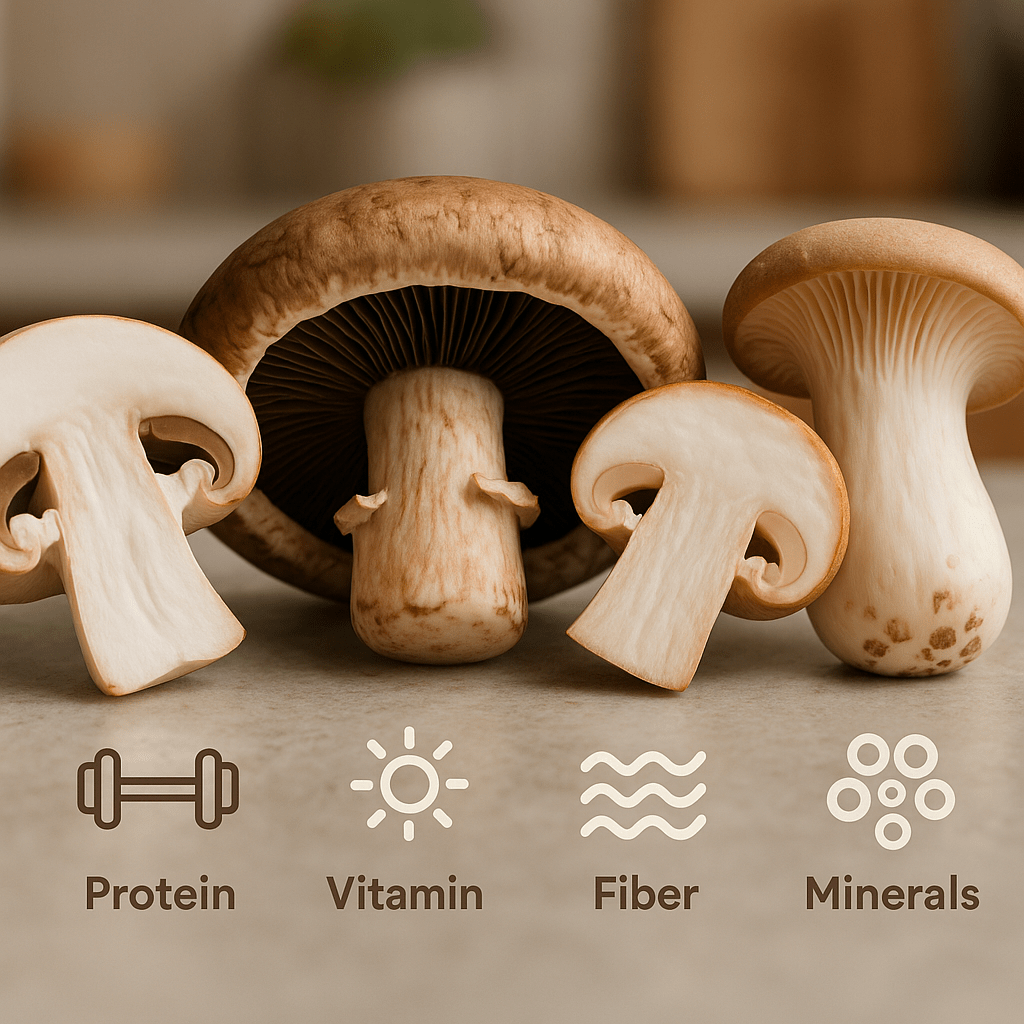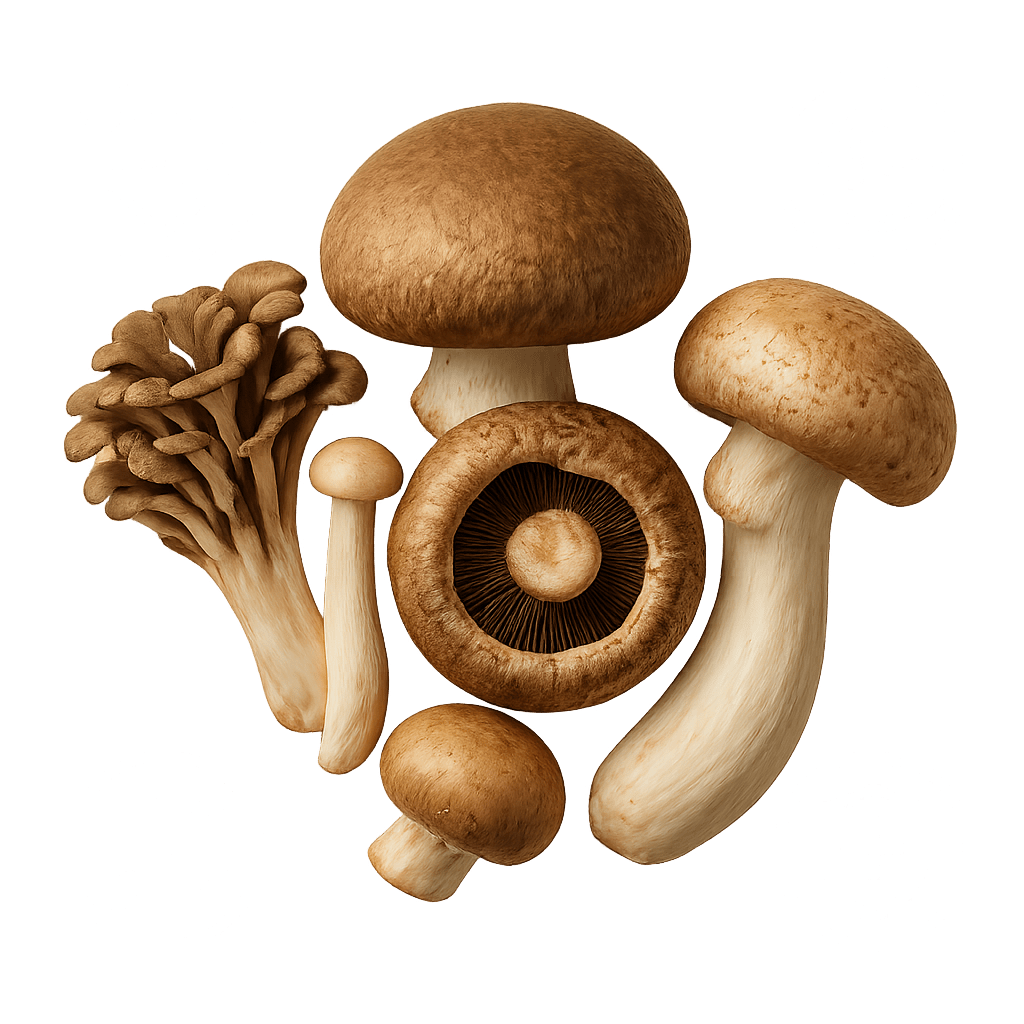Mushrooms are unique creations of nature that are neither plants nor animals, but constitute a separate group of organisms. Their role in human nutrition and health is becoming increasingly important, especially in the search for natural ways to support the functions of the body.

Many valuable mushroom species grow in the forests and fields of Lithuania, which our ancestors collected not only for their taste, but also for their medicinal properties.
Mushrooms are distinguished by the fact that, although they are low in calories, they are rich in valuable nutrients – protein, fiber, vitamins and minerals. They can be an excellent choice for both vegetarians and vegans looking for plant-based protein sources, as well as for people who want to strengthen their immunity in natural ways. In this article, we will discuss in detail the composition, nutritional value of mushrooms and how they can contribute to improving various aspects of health, including essential vitamins for strengthening immunity.
Nutritional and chemical composition – what do mushrooms hide?
Mushrooms are a real treasure trove of nutrients, which often remain undervalued. Although different species have different compositions, in general, it can be said that mushrooms are rich in valuable macro- and microelements that can significantly contribute to enriching our daily diet.
Mushrooms are low in calories and fat, but rich in protein, which includes all the essential amino acids.

On average, 100 g of mushrooms contain about 3-4 g of protein, which makes them a valuable source of plant-based protein. In addition, the proteins they contain are more easily absorbed than those of many other plant-based products.
According to the Lithuanian Dietetic Association, mushroom fibers, called chitin, are special in that they help regulate digestive processes and maintain a healthy intestinal microbiota. These fibers also help you stay full longer, which is important for those who want to control their weight.
Vitamins and minerals in mushrooms – how many and which ones?
Mushrooms are particularly rich in B vitamins, which are important for energy production and nervous system function. They contain:
- Vitamin B1 (thiamine), which helps the body convert food into energy
- Vitamin B2 (riboflavin), which is essential for normal growth and red blood cell production
- Vitamin B3 (niacin), which is important for the functioning of the nervous system and digestion
- Vitamin B5 (pantothenic acid), which is involved in energy production
- Vitamin B9 (folic acid), which is essential for DNA synthesis and cell division
One of the unique benefits of mushrooms is the vitamin D2 (ergocalciferol) they contain. It is one of the few plant sources of vitamin D, especially important in the winter months when sunlight is scarce. Scientists from the Faculty of Medicine of Vilnius University emphasize that vitamin D is essential for calcium absorption, bone health and immune support.
In terms of minerals, mushrooms also stand out:
- Selenium – a strong antioxidant that supports immune function
- Potassium – important for heart and muscle function
- Zinc – essential for immune system function and wound healing
- Iron – necessary for oxygen transport in the blood
- Copper – involved in hemoglobin production and nervous system function
- Magnesium – essential for muscle and nerve function, energy production
- Calcium – necessary for bone and tooth health
Boletus mushrooms growing in Lithuania are characterized by a particularly high selenium content, which makes them valuable for strengthening immunity. Meanwhile, chanterelles stand out for their abundance of vitamin D and antioxidants. Champignons, although not as rich in minerals as wild mushrooms, are an excellent source of B vitamins.
Health effects of mushrooms: disease prevention and quality of life
Scientific research increasingly confirms the positive health effects of mushrooms. Regular consumption of mushrooms can contribute to improving various aspects of health and preventing diseases.
Strengthening immunity
Beta-glucans in mushrooms – special polysaccharides – activate immune system cells, such as macrophages and natural killer cells. These compounds stimulate the immune system’s response to infections and help the body fight pathogens.
Selenium, which is abundant in mushrooms, acts as an antioxidant and helps protect the body’s cells from harmful free radicals. Researchers from the Lithuanian University of Health Sciences confirm that sufficient selenium in the diet is associated with better immune system function.
Cancer prevention
Mushrooms and their extracts are increasingly mentioned as a possible aid in cancer prevention. The antioxidants they contain (especially selenium and vitamin D) help protect cells from DNA damage, which can lead to cancer.
Folic acid, which is also abundant in mushrooms, is essential for healthy cell division and DNA synthesis. It may reduce the risk of certain cancers, especially colon cancer.
Special types of mushrooms, such as Reishi and Cordyceps mushrooms, which provide natural energy and stamina, contain unique bioactive compounds that have shown potential in studies to inhibit the growth of cancer cells.
Diabetes control
The fiber and beta-glucans in mushrooms help regulate blood glucose levels. They slow down the absorption of carbohydrates, helping to prevent sudden spikes in blood sugar levels after meals.
Mushrooms are an excellent choice for people with diabetes due to their low calorie, low carbohydrate content, and low glycemic index. The Lithuanian Society of Endocrinologists recommends including mushrooms in the diet of diabetic patients as part of a balanced diet.
Heart Health
The potassium in mushrooms helps maintain normal blood pressure, which is one of the most important factors in the prevention of heart disease. Lecithin, which is found in some types of mushrooms, can help reduce blood cholesterol levels.
Beta-glucans, which are a form of soluble fiber, contribute to reducing “bad” (LDL) cholesterol levels. This is also confirmed by experts from the Lithuanian Society of Cardiology, who recommend including foods rich in soluble fiber in the diet.
Weight Management
Mushrooms are low in calories and high in fiber, making them a great choice for weight management. They provide a feeling of fullness without being high in calories.
The chitin in mushrooms, a type of fiber, helps you feel fuller for longer and can help reduce your overall calorie intake. Mushrooms are also a great source of protein, which requires more energy to digest than other food components.
Cognitive Support
Mushrooms are rich in choline, which is essential for the production of neurotransmitters and normal nervous system function. They may help improve memory and cognitive function.
Some specific types of mushrooms, especially Lion’s Mane mushrooms, have shown potential in studies to stimulate the production of nerve growth factor, which may be beneficial for brain health. These mushrooms have been used in traditional Eastern medicine to improve brain function.
Mushroom Types Overview – Which Ones to Choose?
Various types of mushrooms grow in Lithuania and around the world, with different nutritional values and health effects. Here are the most important mushrooms that are worth paying attention to for their health benefits.
Wild mushrooms
Boletus (porcini) is considered the king of mushrooms for a reason – it is rich in protein, vitamin D, selenium and copper. It is one of the most nutritious wild mushrooms, which also has a great taste. On average, 100 g of boletus has 3-5 times more selenium than other mushrooms.
Chanterelles are distinguished by a high content of vitamin D, vitamin A and potassium. They also have natural antibacterial properties. These bright orange mushrooms are low in calories and are a great choice for those who follow a diet.
Lepšės are characterized by a high content of zinc and are valued for their unique taste. They are also rich in B vitamins.
Red-top mushrooms are distinguished by a high content of vitamin B12, which is not typical of most other mushrooms. They are also rich in iron.
Button mushrooms are an excellent source of selenium and copper. They have antioxidant properties and help boost immunity.
Cultivated mushrooms
Button mushrooms are the most popular cultivated mushroom in the world. Although they are not as rich in minerals as wild mushrooms, they are rich in B vitamins and selenium. They also contain ergothioneine, a powerful antioxidant that can help protect the body’s cells from oxidative stress.
Functional and Adaptogenic Mushrooms
Lion’s Mane is a unique mushroom that has shown potential in studies to stimulate the production of nerve growth factor. It supports cognitive function, memory and concentration, and cognitive function. These mushrooms are traditionally used to support the nervous system.
Reishi is an adaptogenic mushroom that helps the body adapt to stress. It has immunomodulatory properties and can help regulate the immune system. Reishi may also help improve sleep quality.
Cordyceps is an adaptogenic mushroom known for its ability to increase energy and endurance. It can improve oxygen uptake in the body and increase the production of ATP (an energy molecule). Athletes often use Cordyceps extracts to improve physical performance.
In terms of nutritional value, wild mushrooms tend to have more minerals and bioactive compounds than cultivated mushrooms, but the latter are more available year-round and pose a lower risk of poisoning. Functional mushrooms are distinguished by specific compounds that may have a positive effect on certain aspects of health, and are most often consumed as dietary supplements or teas. All of these mushrooms can be included in a diet that supports healthy digestion.
Mushroom consumption: how much, how and for whom is it safe?
Although mushrooms have many beneficial properties, their consumption should be responsible and moderate. Recommendations from Lithuanian dietitians and nutrition experts will help ensure the safe and beneficial consumption of mushrooms.
Recommended amount and frequency
It is recommended that healthy adults consume no more than 100-200 g of prepared mushrooms 2-3 times a week. Excessive amounts of mushrooms can complicate digestion due to the chitin they contain – a difficult-to-digest fiber.
Mushroom consumption should be limited in children under 7 years of age, as their digestive system is not yet fully developed and may have difficulty coping with the fiber contained in mushrooms. Older children can consume small amounts of well-prepared mushrooms, starting with small portions.
Preparation methods and their importance
Heat treatment is necessary for most mushrooms because:
- Breaks down the chitin structure, making them easier to digest
- Destroys potentially dangerous microorganisms
- Neutralizes some toxins that may be present in some mushroom species
- Improves nutrient absorption
The nutritional properties of mushrooms are best preserved by stewing, frying at low temperatures, or boiling for a short time.

Overcooking can reduce the amount of some vitamins.
Who should avoid mushrooms?
Mushroom consumption should be limited or avoided altogether:
- Young children (under 3-5 years old)
- People with digestive disorders (e.g. irritable bowel syndrome)
- People with kidney or liver disease
- People with allergies to mushrooms
- Pregnant and nursing women should be especially careful with wild mushrooms
- Elderly people whose digestive systems may be more sensitive
Environmental pollutants and choosing quality mushrooms
Mushrooms have the ability to absorb and accumulate heavy metals and other pollutants from the environment. Therefore, it is important to:
- Avoid picking mushrooms near roads, industrial zones, or polluted areas
- Buy mushrooms from trusted suppliers who ensure quality control
- Choose organically grown mushrooms if possible
- Wash mushrooms thoroughly before eating, even if you plan to peel them
Mushroom Poisoning and How to Prevent It
Mushroom poisoning is a serious health problem that is different from a simple indigestion reaction. It is important to understand these differences and know how to recognize the danger signs.
Symptoms of Poisoning
Symptoms of poisoning with poisonous mushrooms can appear from 20 minutes to 24 hours after consumption, depending on the type of mushroom and the nature of the toxins:
- Severe nausea and vomiting
- Abdominal pain and diarrhea
- Dizziness and weakness
- Sweating and shivering
- Hallucinations (in the case of some mushrooms)
- Jaundice (a later symptom indicating liver damage)
- Reduced urine output (may indicate kidney damage)
It is especially dangerous when symptoms appear late (after 6-24 hours), as this often indicates more serious poisoning, which can damage the liver and kidneys.
Rules for safe mushroom picking
To avoid mushroom poisoning, it is necessary to follow a few basic rules:
- Collect only those mushrooms that you really know

- If in doubt – don’t eat it
- Use reliable mushroom identification guides or apps
- It is best to pick mushrooms with an experienced mushroom picker
- Avoid very young mushrooms, which are harder to identify
- Do not use folk methods to determine toxicity (e.g., darkening of a silver spoon)
- Do not pick mushrooms in plastic bags – they may spoil faster
The most dangerous mushroom species in Lithuania
There are several extremely dangerous mushroom species growing in Lithuania that must be identified:
- Green fly agaric – one of the most poisonous mushrooms, the toxins of which can cause liver and kidney failure
- White fly agaric – very similar to edible species of champignons, especially dangerous
- Red fly agaric – easier to recognize due to its bright color, causes neurological symptoms
- Poisonous boletus – can be confused with edible mushrooms
If you suspect mushroom poisoning, you must immediately consult a doctor or call the general emergency hotline 112. You should not try to self-medicate, as some mushroom toxins require specific treatment. Recognizing the symptoms of mushroom poisoning is essential to provide timely medical assistance.
Mushrooms in our diet: benefits and prospects
Mushrooms are a valuable food group that can significantly contribute to a balanced diet. Their unique combination of nutrients – vitamins, minerals and bioactive compounds – provides a variety of health benefits, from strengthening immunity to preventing chronic diseases.
However, the most important thing in consuming mushrooms is balance and safety. Choose a variety of mushroom species, prepare them correctly and consume them in moderation. Pay special attention to the quality and origin of the mushrooms – this will ensure not only their nutritional value, but also their safety.
Functional mushrooms such as Reishi, Lion’s Mane and Cordyceps open up new prospects for targeted health support. Their extracts and dietary supplements are becoming increasingly popular among people looking for natural ways to improve specific aspects of their health.
Traditional Lithuanian cuisine has always valued mushrooms as not only a tasty but also a healthy food. Modern scientific research confirms the wisdom of our ancestors – mushrooms are indeed a valuable food that is worth including in your diet, of course, following the principles of safety and moderation.
Frequently Asked Questions (FAQ)
What are the main vitamins and minerals found in mushrooms?
Most edible mushrooms are rich in B vitamins (B1, B2, B3), vitamin D2, selenium, potassium, zinc and iron. Different types of mushrooms may have different amounts of the dominant nutrients.
Can mushrooms help boost the immune system?
Yes, compounds in mushrooms, such as beta-glucans and selenium, have been linked to boosting immunity, as supported by scientific research and health expert opinions.
Are mushrooms good for people with diabetes?
Mushrooms are low in calories and carbohydrates, but high in fiber, which helps regulate blood sugar levels and maintain a healthy weight – making them a good choice for people with diabetes.
How to avoid mushroom poisoning?
Only consume recognizable, edible mushrooms from reliable sources. When picking mushrooms in the forest, avoid unfamiliar species, always cook mushrooms thoroughly, and seek medical attention if you experience any symptoms after eating them.
What is the difference between wild and cultivated mushrooms in terms of health benefits?
Both provide important nutrients, but wild mushrooms often have higher levels of certain minerals and bioactive compounds. However, cultivated mushrooms offer year-round availability and a lower risk of contamination or poisoning.

